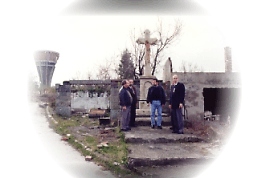

Humanitarian proposals
Prologue
This is a proposal--within a framework of definitions--to include spiritual well-being in the definition of health, and to index the terms genocide and holocaust in Index Medicus.
Thus, this proposal calls for the responsibility of medicine, particularly in terms of public health, in the struggle against hatred and genocide.
Among the rights to peacemaking, the following are proposed: the prevention of hatred and the establishment of the right to a home, the right of civilians to active participation in crisis situations and the right of detained and missing persons to unconditional release and location after the end of armed conflict.
Another proposal is to protect hospitals, prisoner of war camps, refugee camps and abandoned populations during armed conflicts.
There is a also a proposal to introduce mandatory peacemaking and humanitarian evaluation after conflicts with the goal of esablishing the effective (active) performance of acts of goodness among people, and the effectiveness of rendered humanitarian protection.
1. BASIC FEATURES
1.1. A Definition of Health
Spiritual well-being entails a lack of spiritual ‘contamination’ (hatred) with a predilection for tolerance. A person who hates cannot be considered healthy.
“Health is a state of complete physical, mental, social and spiritual well-being, and not simply the lack of illness or incapacity.”
1.2. The Introduction of the Terms GENOCIDE and HOLOCAUST to Index Medicus
The terms genocide and holocaust must be classified in Index Medicus. This will emphasize the responsibility of medicine, particularly of public health, in the prevention and cessation of, and systematic action and reasearch (both independent and inter-sector) on genocide.

2. PEACEMAKING RIGHTS
2.1. The Prevention of Hatred
The advancement of tolerance and the prevention and mitigation of hatred are human rights which enable the realization of the foundations of humanity--dignity and mutual relationships in the spirit of brotherhood.
For this purpose, the monitoring of hatred (‘Hate Watch’) must be introduced, with defined and comparable indicators.
Hatred can increase, sustain itself, diminish and cease in an individual or in a population. Raising the level of hatred in a community is one of the leading early signs that becomes apparent before the commencement of persecution, war, genocide and other extreme forms of the mass violation of human rights.
Hatred is sustained and fostered through political, cultural, scholarly and other organizations and individuals, through writings, laws and other decisions and statements, and particularly through the mass media.
Determining the extent of hatred, its reduction and the prevention of its growth among national, religious and other groups must be the subject of regular study and monitoring. This can be implemented through scientific research, parliamentary organizations, the media and international and other methods.
2.2. The Right to a Home
The right to a home is a fundamental human right.
The right to return to a home must be realized within a period of two years. If this is not implemented, refugees must have the right to chose a country in which they wish to renew thir home.
Until now, the UNHCR has primarily received refugees, accommodated them in camps and other places and assisted in their resettlement to third countries. This entire concept, i.e. taking people from their homes, must be completely inverted: establish the Right to a Home, i.e. the right to remain in or return to homes as one of the fundamental human rights.
Refugee insurance must be introduced with the goal of protecting social rights, i.e. the social welfare of refugees should be ensured from the very beginning of their exile. The financing of this project should be implemented as a part of the obligations of all United Nations member-states.
The destruction of each home and the expulsion of each individual is a global event.
A system of international human rights and an effective organization to prevent the seizure of homes and the creation of refugees must be adopted.
The Right to a Home must be drafted and adopted.
2.3. The Right of Civilians to Participate in Defense and Renewal (Overall Civilian Support)
The role of civilians in the implementation of defense and renewal should be particularly emphasized.
Aggression against civilian populations and their common suffering, as well as the first phases of renewal, are marked by a significant increase in the readiness of civilians to assist one another, strengthen their common defense and particiapate in renewal. More to the point, civilians show their altruism and readiness for personal active participation in general.
This is all the more important since aggression against civilians has been considerable in the course of modern wars.
2.4. The Right to Freedom from Enslavement and the Location of Missing Persons
The location of missing persons and the release of detainees should be an unconditional part of every peace treaty implemented on the international level.
The goal of implementation will require the establishment of a body consisting of international political representatives (the UN and regional organizations), humanitarian organizations (UNHCR, ICRC; IFRC, the UN Special Rapporteur on Human Rights), the conflicting parties and special participants.
This appointed group must have the right to demand the unconditional location of all missing persons and secure the release of all detainees taken in the theatre of war. Any obstruction of its work should be considered a war crime and a violation of the peace treaty (truce).
A large number of present-day conflicts end in compromise. The release of detainees and the location of missing persons must be unconditional.
The introduction of an international war crimes tribunal with
the concurrent abandonment of agreements dealing with the fate of missing persons and
detainees between the conflicting parties directly endangers detainees and missing
persons. The interested parties then refuse to release the latter, or do even worse
things, fearing that after being freed these persons will testify against them before the
International Tribunal.
...